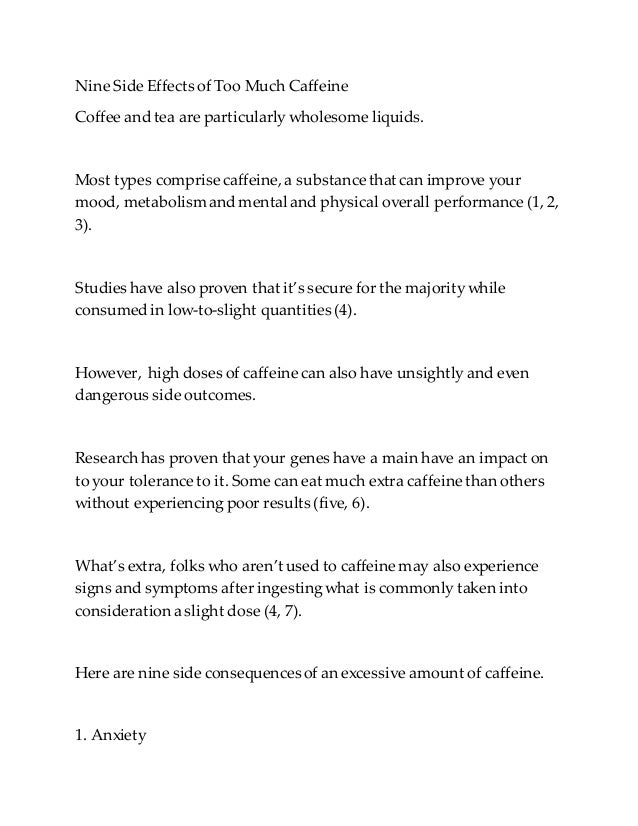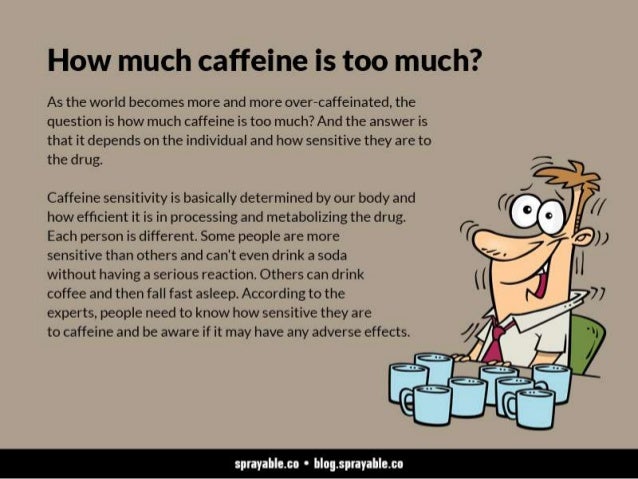


200 mg of caffeine is found in 4 cups of tea or 1 espresso.īreastfeeding women – can drink caffeine in moderation. Having large amounts of caffeine during pregnancy may increase the risk of miscarriage, stillbirth and having a baby with low birthweight. Pregnant women – it’s recommended that you limit caffeine intake to below 200mg per day during pregnancy and that you avoid energy drinks. Image: MOH, Eating and Activity Guidelines for Adults, 2020 Pregnant and breastfeeding women, children and athletes The Ministry of Health recommends having no more than 7 cups of tea or instant coffee per day or 3 single shot espresso coffees per day. Research suggests 400 mg per day is acceptable for most people, but it does depend on your body size and metabolism.

The effects from caffeine are felt within 5–30 minutes of having it and can last for 4–6 hours. In large doses, it can make you feel anxious or have difficulty sleeping. In small doses it can make you feel more alert, awake, clear-minded and able to concentrate. It’s found in coffee, tea, energy drinks, cola drinks, chocolate, fermented beverages (kombucha), and some dietary supplements and medications.Ĭaffeine is a stimulant, increasing activity in your brain and nervous system. Avoiding caffeine, staying hydrated, and waiting it out are your best options to reduce its effects.Caffeine is one of the world’s most widely used drugs. Once caffeine is in your system, it’s difficult to get rid of.
#Too much caffeine symptoms professional
Be sure to speak to your healthcare professional before taking it ( 9, 10, 11). Though it won’t counteract the stimulatory effects of caffeine, this amino acid supplement may help relieve anxiety and reduce blood pressure. Opt for slow-digesting, fiber-rich foods, such as whole grains, beans, lentils, starchy vegetables, nuts, and seeds ( 1). Eat fiber-rich foodĮating may slow the release of caffeine into your bloodstream. Alternatively, practice meditation to calm your mind and nervous system. If you’re feeling anxious, take slow, deep breaths for 5 minutes. Go for a light walk to relieve anxiety and jitters. Though this is rare for those who regularly consume caffeine from coffee or tea, hydrating can help reduce some of these effects ( 7, 8). Therefore, it may help to increase your water intake while you wait for the caffeine to leave your system.Īdditionally, if you’re not used to caffeine, it may act as a mild diuretic and lead to increased urination and more frequent stools. This could be because dehydration may make symptoms worse. Though limited research is available, many anecdotal reports claim that drinking water helps relieve caffeine-induced jitters. Stay hydratedĭrinking water is important for staying hydrated throughout the day. If you’re worried about sleep, it’s best to stop consuming caffeine 6–8 hours before bedtime. It will then take another 5 hours to reduce the amount in your blood to 25% ( 3). Moreover, the half-life of caffeine is 5 hours, which means the amount of caffeine in your system will take 5 hours to be reduced by half. Wait it outĬaffeine’s stimulatory effects are usually noticeable within the first 45 minutes of intake and can last 3–5 hours ( 3). For example, over-the-counter pain relievers like Aspirin (acetylsalicylic acid) can pack upwards of 40–60 mg in a single tablet ( 6).įinally, certain performance-enhancing formulas like pre-workout supplements may have high amounts of caffeine, with up to 250 mg in just 2 teaspoons (10 grams). Still, it contains very low amounts of caffeine, at 2–7 mg per cup (240 mL) ( 4, 5).įurthermore, pay attention to medications, supplements, and personal care products that may harbor caffeine. Foods and beverages with caffeine include coffee, tea, energy drinks, soda, dark chocolate, and some ice creams and desserts.ĭecaf coffee is a good option if you still want to enjoy the flavor and health benefits of coffee. If you notice uncomfortable symptoms like shakiness, stop consuming caffeine immediately. Stop caffeinating as soon as you notice adverse effects Nonetheless, you can take a few steps to minimize its side effects.

The only way to get rid of it is to wait for it to naturally flush itself. In fact, once it has entered your body, there’s not much you can do to flush caffeine out. Caffeine’s effects are known to last for several hours - and you may have stronger jitters if you drank a lot of coffee, soda, energy drink, or some other caffeinated beverage ( 3).


 0 kommentar(er)
0 kommentar(er)
